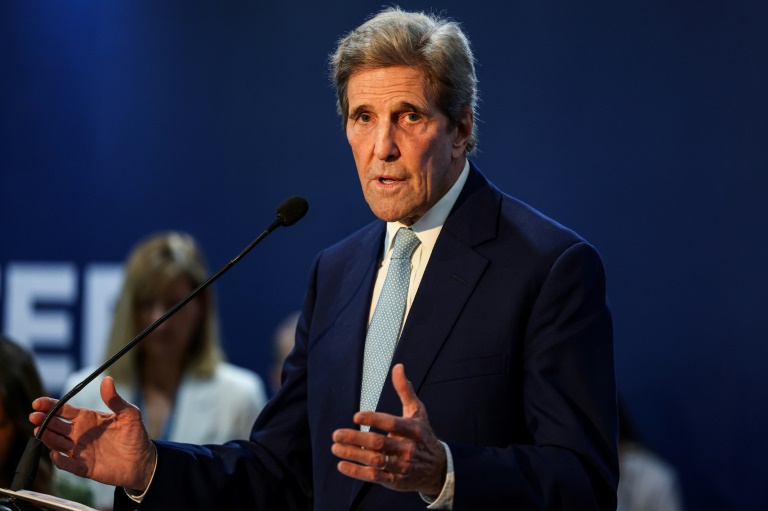US climate envoy John Kerry admitted carbon credit schemes had been abused and 'discredited' before
The United States launched Wednesday a partnership with private funds aimed at supporting the transition to renewable energy in developing nations, based on a carbon credit system criticised by climate activists.
The government scheme, launched at the COP27 climate conference in Egypt along with the Bezos Earth Fund and Rockefeller Foundation, would help emerging economies attract finance “to support their clean energy transitions”, Washington said.
Companies, like Microsoft and Pepsi who have expressed interest in the plan, would invest in renewable energy projects, allowing countries to show reductions in greenhouse gas emissions that could then be sold back to those companies as carbon credits.
“Our intention is to put the carbon market to work to deploy capital… to speed the transition from dirty to clean power,” US climate envoy John Kerry said, promising “safeguards” against greenwashing.
Kerry said he hoped the project, which Chile and Nigeria already said they may join, would get off the ground within a year.
Climate campaigners have criticised the US scheme, launched a day after a UN expert panel said carbon credits should not be used to “offset” emissions instead of actually cutting them.
– ‘Accounting trick’ –
Earth has warmed on average nearly 1.2 degrees Celsius since pre-industrial times, provoking an accelerating onslaught of climate change impacts like storms, floods and heat waves.
Under the Paris climate deal, countries have agreed to limit warming to well under 2C, preferably 1.5C.
That more ambitious goal requires slashing global emissions in half by 2030 and reducing them to net zero by mid-century, scientists say.
“We need to see deep emissions reductions in both the global north and south — not rich polluting companies in the north paying for the privilege of continuing to destroy the planet,” said Mohamed Adow of the think tank Power Shift Africa.
“These carbon offsets are an accounting trick which will create loopholes for polluters to carry on polluting.”
Harjeet Singh of Climate Action Network told AFP similar schemes had not helped reduce emissions in the past.
The UN expert report said some offsets could be effective, like supporting energy transitions in developing countries — but stressed this should only be an additional measure after companies cut their own emissions.
Kerry acknowledged that prior abuses of carbon credit schemes had “discredited” these tools in the eyes of many.
He said the programme would only be open to companies ready to also commit to short-term reduction targets.
“We believe we shouldn’t let the mistakes of the past keep us from employing a powerful tool for steering private capital where it’s most needed.”
Angela Churie Kallhauge of the US-based non-profit Environmental Defense Fund said the scheme could help boost energy transitions.
“We’ve spoken for so long about the need to scale up — here is a big opportunity to explore and innovate.”









